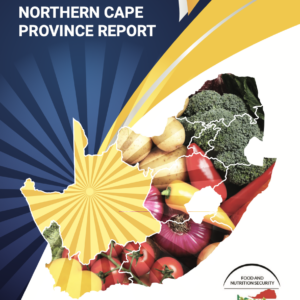National Food and Nutrition Security Survey: National Report
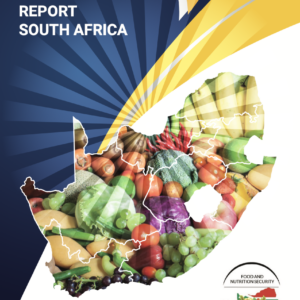
South Africa is remarkably one of the countries that explicitly recognizes the right to food in its foundational document, the Constitution. Section 27 (1) (b) of the Constitution states that everyone has the right to have access to sufficient food and water and that the state must take reasonable legislative and other measures, within its available resources, to achieve the progressive realization of each of these rights.
Improving food and nutrition security is, therefore, a priority for the country. Detailed data on the status and trends for food insecurity and malnutrition is essential for effective policy decisions, planning, and targeting of interventions.
South Africa is a signatory of the Dar Es Salaam Declaration on Agriculture and Food Security. Under this declaration, the Southern African Development Community (SADC) Secretariat was mandated by all SADC Heads of State to enhance coordination of the vulnerability assessment and analysis activities taking place in various member states. This was based on a clear recognition that accurate food insecurity and vulnerability assessments are vital for enabling coherent planning, policy development, advocacy, and targeting of food security interventions. The mandate given to SADC resulted in the formation of the Regional Vulnerability Assessment and Analysis (RVAA) Programme and National Vulnerability Assessment Committees (NVACs).
Vulnerability assessments are, therefore, conducted through the National Vulnerability Assessment Committees (NVACs). In South Africa, the South African Vulnerability Assessment Committee (SAVAC) is responsible for conducting the vulnerability assessments and analysis. The DALRRD serves as the secretariat and chair of the SAVAC. SAVAC plays a crucial role in identifying the main drivers of food insecurity in South Africa, and advising on targeted interventions. By conducting vulnerability assessments, the committee gains a better understanding of the socio-economic factors that contribute to food insecurity and ensure that resources and policies are effectively directed towards addressing these root causes. The DALRRD provides support as the secretariat and, likewise, coordinates the SAVAC partners towards ensuring that the Committee is well- equipped to drive the development of innovative solutions that tackle food insecurity assessment head-on.
National Food and Nutrition Security Survey: Provincial Report: Western Cape
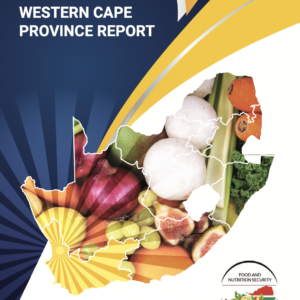
This report is based on the empirical evidence collected from selected Small Area Layers (SALs) within the five districts of the Western Cape province. SAL is the smallest geographical unit usually allocated to a single enumerator during census enumeration. In other words, it constitutes a small piece of land for an enumerator to cover to administer a questionnaire during a census or study (Statistics South Africa). Each of the SALs in this survey had 35 visiting points (households). The results provide a baseline assessment of the status quo of food and nutrition security in the province. The data was collected within the data was collected more than 8 months after the COVID-19 lockdown measures, a period characterized by much more relaxed restrictive COVID-19 measures. This greatly influenced and changed the picture from what would ordinarily obtain under a normal situation. Whilst this research project has benefited from the valuable insights and input of a Technical Advisory Group (TAG) that provided comments and reviewed the final research report, the ultimate responsibility for the contents therein (including but not limited to unintentional errors, inaccuracies, or omissions) rests with the authors and researchers involved. Users of this research should exercise their judgment and discretion when interpreting the findings and recommendations presented herein.
National Food and Nutrition Security Survey: Provincial Report: North West
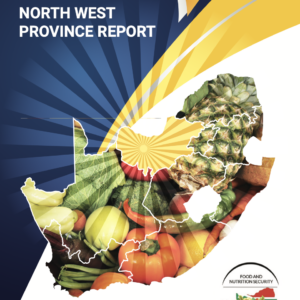
This report is based on the empirical evidence collected from selected Small Area Layers (SALs) within the four districts of the North West Province. SAL is the smallest geographical unit usually allocated to a single enumerator during census enumeration. In other words, it constitutes a small piece of land for an enumerator to cover to administer a questionnaire during a census or study (Statistics South Africa). Each of the SALs in this survey had 35 visiting points (households). The results provide a baseline assessment of the status quo of food and nutrition security in the province. The data was collected during COVID-19 lockdown around November-December 2021. This greatly influenced and changed the picture from what would ordinarily obtain under a normal situation. Whilst this research project has benefited from the valuable insights and input of a Technical Advisory Group (TAG) that provided comments and reviewed the final research report, the ultimate responsibility for the contents therein (including but not limited to unintentional errors, inaccuracies, or omissions) rests with the authors and researchers involved. Users of this research should exercise their judgment and discretion when interpreting the findings and recommendations presented herein.
National Food and Nutrition Security Survey: Provincial Report: Mpumalanga Province
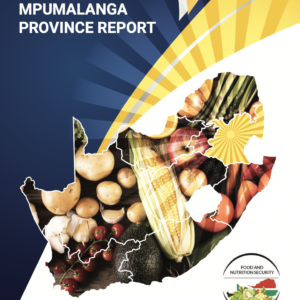
This report is based on the empirical evidence collected from selected Small Area Layers (SALs) within the five districts of Mpumalanga province. SAL is the smallest geographical unit usually allocated to a single enumerator during census enumeration. In other words, it constitutes a small piece of land for an enumerator to cover to administer a questionnaire during a census or study (Statistics South Africa). Each of the SALs in this survey had 35 visiting points (households). The results provide a baseline assessment of the status quo of food and nutrition security in the province. The data was collected during COVID-19 lockdown around September-October 2021. This greatly influenced and changed the picture from what would ordinarily obtain under a normal situation. The project benefited from the valuable insights and input of the advisory board that provided comments and reviewed the research reports. Albeit they cannot be held accountable for errors or omissions that may exist in the report. Whilst this research project has benefited from the valuable insights and input of a Technical Advisory Group (TAG) that provided comments and reviewed the final research report, the ultimate responsibility for the contents therein (including but not limited to unintentional errors, inaccuracies, or omissions) rests with the authors and researchers involved. Users of this research should exercise their judgment and discretion when interpreting the findings and recommendations presented herein.
National Food and Nutrition Security Survey: Provincial Report: Limpopo
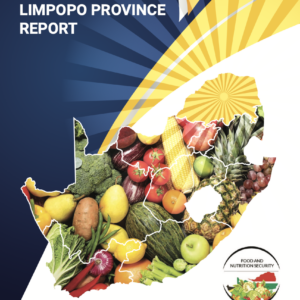
This report is based on information gathered from specific Small Area Layers (SALs) located throughout South Africa’s nine provinces. A Small Area Layer is the smallest geographic unit that is typically assigned to a single enumerator during a census or enumeration. For the National Food and Nutrition Security Survey, 35 visiting points (households) made up the SAL. Except for Limpopo Province whose SALs had 20 visiting points (households). The findings presented in this report provide a baseline assessment of South Africa’s current state of food and nutrition security. The data was gathered at the peak of Covid-19 in Limpopo, Mpumalanga, and North West provinces. The overall effects of strict Covid-19 restrictions are likely to have an influence on the results presented in these three provinces due to the limited movements and interaction among people. Data collection in the rest of the provinces was done in less restrictive Covid-19 lockdown measures however the post covid effects may have influenced the overall outcome on some of the food security and nutrition indicators. This research project has benefited from the valuable insights and input of a Technical Advisory Group (TAG) that provided comments and reviewed the final research reports. Ultimately, the contents of this research project are the responsibility of the authors and principal researchers involved. Users of this research should exercise their judgment and discretion when interpreting the findings and recommendations presented herein.
National Food and Nutrition Security Survey: Provincial Report: KwaZulu-Natal
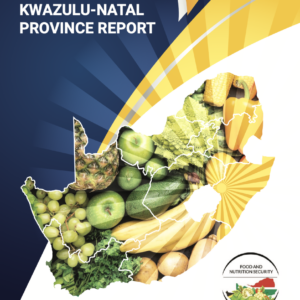
This report is based on the empirical evidence collected from selected Small Area Layers (SALs) within the four districts of the KwaZulu-Natal province. SAL is the smallest geographical unit usually allocated to a single enumerator during census enumeration. In other words, it constitutes a small piece of land for an enumerator to cover to administer a questionnaire during a census or study (Statistics South Africa). Each of the SALs in this survey had 35 visiting points (households). The results provide a baseline assessment of the status quo of food and nutrition security in the province. The data was collected during COVID-19 lockdown around November-December 2021. This greatly influenced and changed the picture from what would ordinarily obtain under a normal situation. Whilst this research project has benefited from the valuable insights and input of a Technical Advisory Group (TAG) that provided comments and reviewed the final research report, the ultimate responsibility for the contents therein (including but not limited to unintentional errors, inaccuracies, or omissions) rests with the authors and researchers involved. Users of this research should exercise their judgment and discretion when interpreting the findings and recommendations presented herein.
National Food and Nutrition Security Survey: Provincial Report: Gauteng Province
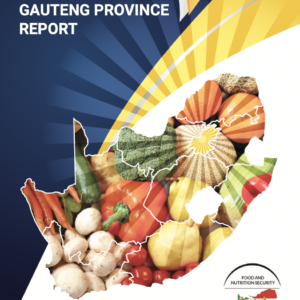
This report is based on the empirical evidence collected from selected Small Area Layers (SALs) within the five districts of the Gauteng province. SAL is the smallest geographical unit usually allocated to a single enumerator during census enumeration. In other words, it constitutes a small piece of land for an enumerator to cover to administer a questionnaire during a census or study (Statistics South Africa). Each of the SALs in this survey had 35 visiting points (households). The results provide a baseline assessment of the status quo of food and nutrition security in the province. The data was collected within the data was collected more than 8 months after the COVID-19 lockdown measures, a period characterized by much more relaxed restrictive COVID-19 measures. This greatly influenced and changed the picture from what would ordinarily obtain under a normal situation. Whilst this research project has benefited from the valuable insights and input of a Technical Advisory Group (TAG) that provided comments and reviewed the final research report, the ultimate responsibility for the contents therein (including but not limited to unintentional errors, inaccuracies, or omissions) rests with the authors and researchers involved. Users of this research should exercise their judgment and discretion when interpreting the findings and recommendations presented herein.
National Food and Nutrition Security Survey: Provincial Report: Free State
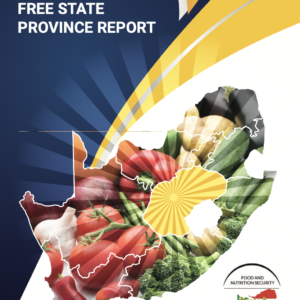
This report is based on the empirical evidence collected from selected Small Area Layers (SALs) within the five districts of Free State Province. SAL is the smallest geographical unit usually allocated to a single enumerator during census enumeration. In other words, it constitutes a small piece of land for an enumerator to cover to administer a questionnaire during a census or study (Statistics South Africa). Each of the SALs in this survey had 35 visiting points (households). The results provide a baseline assessment of the status quo of food and nutrition security in the province. The data was collected during COVID-19 lockdown around January-February 2022. This greatly influenced and changed the picture from what would ordinarily obtain under a normal situation. The project benefited from the valuable insights and input of the advisory board that provided comments and reviewed the research reports. Albeit they cannot be held accountable for errors or omissions that may exist in the report. Whilst this research project has benefited from the valuable insights and input of a Technical Advisory Group (TAG) that provided comments and reviewed the final research report, the ultimate responsibility for the contents therein (including but not limited to unintentional errors, inaccuracies, or omissions) rests with the authors and researchers involved. Users of this research should exercise their judgment and discretion when interpreting the findings and recommendations presented herein.
National Food and Nutrition Security Survey: Provincial Report: Eastern Cape
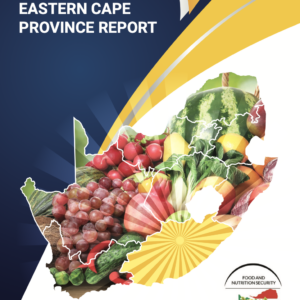
This report is based on the empirical evidence collected from selected Small Area Layers (SALs) within the five districts of the Eastern Cape province. SAL is the smallest geographical unit usually allocated to a single enumerator during census enumeration. In other words, it constitutes a small piece of land for an enumerator to cover to administer a questionnaire during a census or study (Statistics South Africa). Each of the SALs in this survey had 35 visiting points (households). The results provide a baseline assessment of the status quo of food and nutrition security in the province. The data was collected within the data was collected more than 8 months after the COVID-19 lockdown measures, a period characterized by much more relaxed restrictive COVID-19 measures. This greatly influenced and changed the picture from what would ordinarily obtain under a normal situation. Whilst this research project has benefited from the valuable insights and input of a Technical Advisory Group (TAG) that provided comments and reviewed the final research report, the ultimate responsibility for the contents therein (including but not limited to unintentional errors, inaccuracies, or omissions) rests with the authors and researchers involved. Users of this research should exercise their judgment and discretion when interpreting the findings and recommendations presented herein.
